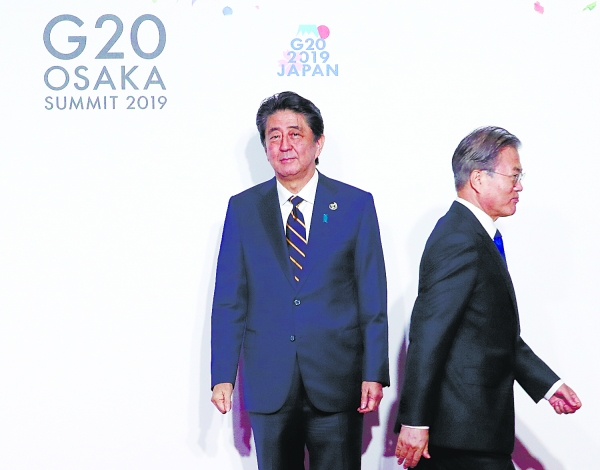
This summer the diplomatic row between Korea and Japan escalated into a financial dispute as they started imposing economic measures on each other. On July 1, Japan’s Ministry of Economy, Trade and Industry announced that it would restrict exports of key materials for manufacturing semiconductors and display panels. Starting with this, a full-fledged trade dispute has begun and relations between Seoul and Tokyo seem to be heading toward collapse. To understand why this trade war started we need to look through a recent ruling made in Korea’s Supreme Court.
During the World War II, there were Korean laborers who were forced to do unwaged work for Japanese companies. Among these victims, those who were used by Nippon Steel Corporation filed a lawsuit against the company after Korea was freed. After a long judicial procedure, the Supreme Court ruled that the company should pay 100 million KRW to each the plaintiffs. The court judged that the victims have the right to claim compensation from the companies because the right to claim compensation for forced labor based on the premise of illegal activities cannot be considered to be included in the agreement made in 1965. However, Japan claimed that wartime reparations were settled under the 1965 agreements.
At that time, however, most legal experts predicted that Japanese companies would refuse to pay compensation and that it would be difficult to enforce any compulsory execution. Contrary to such expectations, the Pohang branch of the Daegu District Court began the process of freezing and seizure of local assets of the companies on Jan. 8. Of course, the Japanese government protested and went so far as to impose retaliatory economic sanctions on Korea.
On July 4, Japan changed the export regulations of photoresist (PR), high purity hydrogen fluoride (Eching Gas), and flurinated polyimides (FPI) to a much tighter restriction. All three materials are essential for the production of semiconductors and display panels. Despite Korea’s protest, Japan went on to further enhance their export restrictions and decided to exclude South Korea from their ‘white list’.
Japan’s white list countries are those that the Japanese government has judged to have no security problems, and refer to a countries that get preferential treatment in the licensing process for Japan’s exports of its products. Products normally exported abroad need to be individually screened but, for a white list country, the process of exporting important goods, including strategic goods, is simplified.
Japan on Aug. 7 promulgated a revised export trade control decree that calls for Korea to be excluded from the white list starting from Aug. 28. Under the revised bill, Korea is now subject to individual screening for certain export items that the Japanese government has designated to be ‘sensitive’. Items that Japan considers that it could be diverted for military use will face stricter regulations.
With regards to the Japanese move, the Korean government first raised the issue at the World Trade Organization (WTO)’s Council for Trade in Goods on July 7 to 8, in a bid to publicize the fact that Japan’s export regulations violate WTO norms and are an economic retaliation made for political purposes. After Japan decided to remove Korea from their white list on Aug. 8th, Moon Jae in, the president of Korea, presided an extraordinary Cabinet meeting on the same day and announced the measures that Korea would take. They stated that Japan would also be removed from their white list. On Aug. 12, the revising of the trade control became official, and the revised decree is to be applied after September.
Since Japan did not show any sign of retraction of their retaliation, the Korean government made another move. On Aug. 22 a National Security Council meeting was held and on that meeting Korea decided to end the General Security of Military Information Agreement (GSOMIA), an agreement that allows the sharing of military secrets with each other. Kim You-geun, the first deputy chief of the Office of National Security, said in a new conference that “Under this situation, we have determined that it would not serve our national interest to maintain an agreement we signed with the aim of exchanging military information which is sensitive to security”
Besides from government actions, the public of Korea is showing their anger at Japan’s economic retaliation by boycotting Japanese goods. As their boycott continues the impact on Japanese goods and tourism are starting to show some meaningful downfall.


